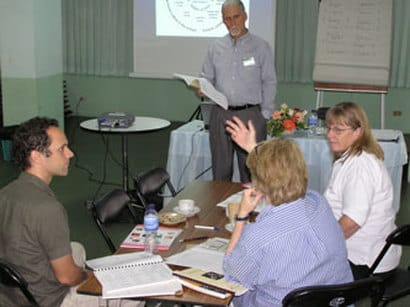SEE
|
SEE Professional Development Workshops are all designed to help support the implementation of specific procedures, strategies or activities to advance student ethical and character development. All workshops align with Character dot org's 11 Principles of Effective Character Education and thus support participation in the National Schools of Character program. Overview of Modern Character Education Participants will be introduced to the comprehensive approach to character education. Key components will be described and small group activities will include—establishing and understanding a core vocabulary for character education, understanding instruction for three domains of character education (head/cognitive, heart/affective, and hand/behavioral), and recognizing eight strategies for character education. Learn more about the comprehensive model. Identifying Core Ethical Values to Build Your School of Character
Core ethical values are the foundation of comprehensive character education. We recognize the challenge some schools face in distinguishing core ethical values from prosocial skills such as listening and conflict resolution, and performance values such as grit and persistence. Participants will identify core ethical values, define them behaviorally, and discuss their application to a variety of school policy and academic objectives. Examples of how this process has supported successful Character.org National Schools of Character applicants will be cited. PDF of PowerPoint Slides Creating a Caring Classroom Community Participants will review and practice strategies that create a caring classroom community. Activities and classroom meeting strategies will be modeled and discussed with a focus on building a sense of shared community and developing social skills to solve group challenges. Methods to implement two specific classroom meetings will be highlighted and include (1) transition meetings and (2) problem-solving meetings. Strategies Promoting Civil Communities
To address proactive class/team management the concepts of civil community and moral discipline will be presented. Participants will recognize how positive character norms can support the development of clear and elevating class expectations. During the workshop, participants will draft class expectation statements, procedures, and rules that support successful class management. Workshop exercises are designed to be repeated with students to assist them in gaining ownership of positive class expectations and procedures. This activity can be focused on school wide or classroom settings. |
|
|
Supporting a Culture of Academic Integrity
Participants will be introduced to strategic steps and draft their own goals to create an academic integrity (AI) committee. AI committee tasks will be suggested and prioritized in small groups to include: (1) Pre and post survey assessment of student and faculty beliefs and observations regarding AI, (2) AI committee research and agreement to define importance and meaning of AI for the school, review, affirm/revise, educate school community on policies to support AI, (3) Creation of subcommittee to track and adjudicate violations of AI policies, (4) Develop strategic plan for ongoing education of school community regarding AI topics, develop and promote a school honor code, (5) Review SEE's on-line professional development course we call the Achieving with Integrity Seminar to learn lesson strategies to support student moral functioning (see Integrity Works! for more detail). |
Teaching Character Through the Curriculum
Using Bloom’s Taxonomy as a guide, participants will practice integrating character development objectives (head, heart, & hand) into selected content lessons. Workshop exercises will include selected reading prompts with character-rich lessons to help recognize activities that elevate student cognitive reasoning while also engaging affective (heart) and behavioral (hand) domains of student learning. Implementation steps for the Laws of Life Essay Program will be presented along with applications of Reasoning with Ethics. This workshop helps schools to reach Common Core objectives of deeper reading and analysis using character as a focus of analysis. The Achieving with Integrity Seminar is a secondary teacher professional development three-session workshop that helps teachers design lessons that support student ethical functioning, purpose and character. |
|
Service Learning
Participants will practice specific cooperative work skills that their students can use to implement successful service-learning and support positive character development. Service-learning is defined to distinguish it from community service and project planning and reflection strategies are introduced and practiced. A Service-Learning Planning and Reflection Guide authored by SEE is available for purchase. Resources will also be drawn from SEE's YES program. |
|
Character Based Decision Making
A character-based decision-making strategy labeled The Golden Compass is described and used to help resolve relevant dilemmas. Age-appropriate scenarios are provided to support the practice of the Golden Compass for students in grades 2 to 12. Participants will recognize how the Golden Compass can be used as a tool to evaluate ethical dilemmas, actions of historical figures and characters in literature. We also offer The Golden Compass, a character-based decision making activity book. |
Conflict Resolution
Participants will be introduced to a vocabulary and set of goals and skills to help students make choices to solve conflicts positively. Depending on the length of the session, participants will practice a variety of social skills that support positive conflict resolution. All social skills included in a workshop are relevant to students and adults with an explicit goal to demonstrate positive character. Social skills that can be included in workshop role-modeling include—(1) recognition and self-control of emotions, (2) listening and speaking skills, (3) “I” messages, (4) reframing, (5) identifying communication roadblocks, (6) negotiating, (7) cooperative teaming, and (8) decision-making. |
Ethics in action creates character

